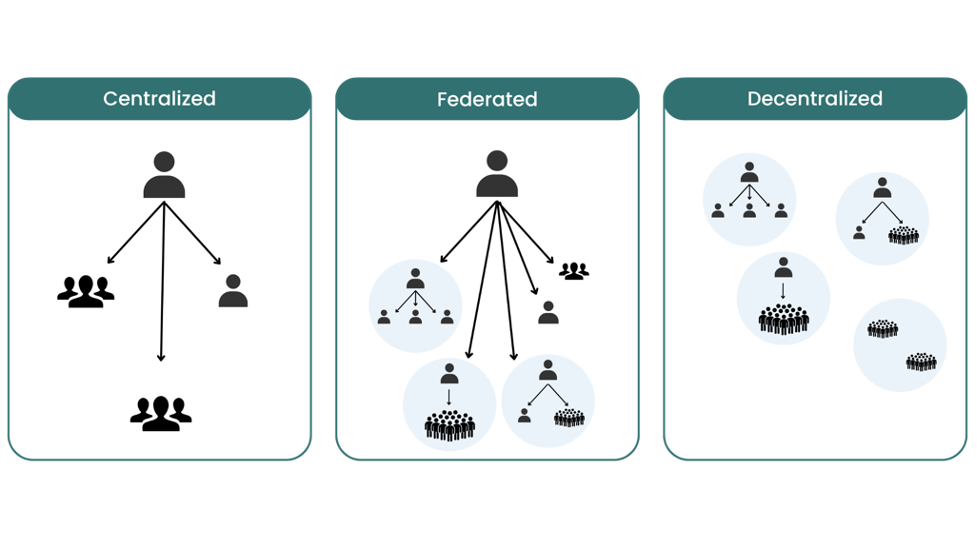Federated Data Governance for the Enterprise
Today, enterprises adopt AI and machine learning to derive insights from their datasets, and it becomes increasingly critical to focus on effectively governing them. As data regulations around the globe impose heavy penalties on non-compliance, modern enterprises must have adequate governance capabilities to prevent exposure.

Large corporations have diverse data needs; with multiple application owners and users spread across the enterprise, it is genuinely complex to configure a governance policy that effectively covers every corner. Data teams could be using disparate silos of applications, data warehouses/lakes/lakehouses, or perhaps a data mesh or a data fabric, all of which starkly vary in control, some centralized while others are highly decentralized. Traditional centralized governance models often fail to provide the agility needed to address localized needs, while fully decentralized approaches can lead to inconsistencies, compliance risks, and fragmented data management. As data regulations tighten globally, the lack of a middle ground puts enterprises at risk of non-compliance, data breaches, and operational inefficiencies.
For instance, in 2018, a data breach of a major European airline operator resulted in the theft of personal and financial data of over 300,000 customers. This breach resulted in violations of GDPR, amongst other data privacy regulations, causing them to pay out over $25 million in fines and legal fees.
Large corporations of today need a governance model that is both robust and flexible to suit evolving use cases. Here is where Federated Data Governance comes into play. Implementing correctly configured federated data governance policies could have helped standardize controls and security policies in the company, thereby reducing avenues for breaches while standardizing encryption and monitoring protocols, reducing exposure.
What is Federated Data Governance?
Federated data governance is a modern strategy combining centralized planning with decentralized governance implementation. As a firm, you can set your corporate principles, policies, and controls. At the same time, business units own their data and make decisions within the organization’s guardrails to address their specific needs and objectives. A federated model also implements a layer of sharing and coordination, providing a feedback channel for business units to the central team and enabling enterprisewide collaboration.
How can Federated Data Governance aid your organization?
Adopting federated data governance in the enterprise can have the following benefits:
- Balanced Control: It allows for centralized oversight and decentralized decision-making, providing corporate vision and policies from a central team while allowing business units to make decisions within established guardrails.
- Scalability: The federation enables data governance to scale with controls, making it suitable for large organizations with multiple business units or diverse data needs.
- Flexibility: Business units have the autonomy to address their specific needs and objectives while still adhering to organizational policies, allowing for greater adaptability to local requirements.
- Enhanced Collaboration: The model implements a layer of sharing and coordination, enabling enterprise-wide collaboration and providing feedback channels between business units and the central team.
- Data Harmonization: It allows for the harmonization of data across different business units, creating an enterprise view of master data while still respecting local data requirements and control
With enterprises adopting newer data management practices today, integrating federated data governance frameworks is essential to navigate the complex regulatory landscape and ensure sustainable, compliant growth. Offering a balanced approach, federated data governance ensures control while allowing individual business units to tailor their data practices as needed.
SOLIXCloud Enterprise Data Lake is a third-generation data lake platform for the enterprise. With built-in capabilities to configure federated data governance in your data environments, SOLIXCloud Enterprise Data Lake reduces your critical risks of non-compliance by ensuring your data is duly protected.
Contact our team of experts to get started on your governance journey.
About the Author
Hello there! I am Haricharaun Jayakumar, a senior executive in product marketing at Solix Technologies. My primary focus is on data and analytics, data management architectures, enterprise artificial intelligence, and archiving. I have earned my MBA from ICFAI Business School, Hyderabad. I drive market research, lead-gen projects, and product marketing initiatives for Solix Enterprise Data Lake and Enterprise AI. Apart from all things data and business, I do occasionally enjoy listening to and playing music. Thanks!
Haricharaun Jayakumar
Hello there! I am Haricharaun Jayakumar, a senior executive in product marketing at Solix Technologies. My primary focus is on data and analytics, data management architectures, enterprise artificial intelligence, and archiving. I have earned my MBA from ICFAI Business School, Hyderabad. I drive market research, lead-gen projects, and product marketing initiatives for Solix Enterprise Data Lake and Enterprise AI. Apart from all things data and business, I do occasionally enjoy listening to and playing music. Thanks!

